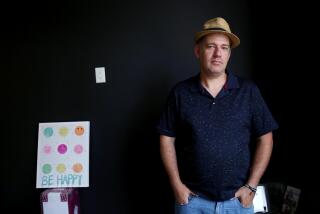Builder Lyon Begins Major Restructuring : Finance: Company President Dick Randall resigning as part of effort to shrink company and meet lender pressure to repay more than $200 million in loans.
- Share via
NEWPORT BEACH — William Lyon Co., California’s largest home builder for the past four years, is undergoing a major restructuring in an effort to satisfy its major banks’ demand for repayment or increased security for more than $200 million in land acquisition and development loans.
As part of the restructuring and the shrinking of the company’s Northern California operations, company President Dick Randall is resigning and will become a full-time consultant to the company as of Jan. 1.
Randall, who lives in San Jose and heads the company’s northern division as well, joined Lyon Co. in 1972 and has been its president since 1981. He could not be reached for comment Friday. His resignation was confirmed by Rick Sherman, senior vice president and general counsel for Lyon Co.
Sherman also confirmed Friday that, in one of the many agreements the company has negotiated with its lenders in recent months, it has agreed to set aside all proceeds from the sale of homes or land in five of its Aliso Viejo projects to help pay interest on land acquisition and construction loans from First Interstate Bank.
Other loan and security agreements reportedly are being renegotiated with the company’s lenders in Northern California.
Development industry sources said this week that Lyon Co. is expected to make several major announcements in early January about land sales and other facets of its business. Sherman said Friday, however, that he is “not aware of any announcements being contemplated.”
Lyon Co. and affiliates own about 5,000 acres in Southern California and 2,000 acres in Northern California. Big chunks of that land, including the five Aliso Viejo developments and the 1,000-acre Mountain Gate Ranch project in Corona in which a Lyon Co. affiliate as well as company founder William Lyon are part owners, were acquired in 1989 when Southern California land prices were at historic highs.
Since then, prices have fallen 40% or more, leaving Lyon and many other developers owing more to their banks than they can raise by selling the land.
Also, slow home sales across California have hurt developers such as Lyon because they often cannot generate sufficient cash from residential sales to make the required interest payments on their loans.
Documents filed with the Orange County recorder’s office show that Lyon Co. in Southern California has renegotiated loan agreements with Bank of America, Citicorp Real Estate Inc. and a consortium of five banks headed by Wells Fargo and including Continental Bank, Chase Manhattan Bank, Union Bank and the former Security Pacific National Bank--now part of Bank of America.
In the deal involving the consortium, Wells Fargo, as agent for the group, signed a document filed Nov. 24 that released the group’s claim, as loan collateral, on a huge classic automobile collection owned by William Lyon.
The document did not make clear whether the release means that Lyon was able to repay the loan or loans secured by the car collection, which is valued at more than $40 million.
Sherman would not comment Friday on that agreement but did say that Lyon still owns the collection. It includes more than a score of rare autos, among them a 1931 Bugatti Royale Coupe de Ville, one of only six in the world, that was valued at $12 million in 1986, when it was part of the extensive collection of the late casino operator William Harrah.
Among the documents filed in recent months is one showing that Lyon Co. has transferred ownership of its corporate headquarters on Von Karman Street in Newport Beach to a limited partnership called DB No. 1 that is headed by a Lyon Co. vice president and housed at the same Von Karman address.
In the Sept. 22 agreement with First Interstate Bank, Lyon Co. agreed to use proceeds from all sales contracts, deposits, payments and sales proceeds from scores of lots in the Crest, Breeze, Highlands, Palisades and Pinnacle developments in Aliso Viejo. The assignment means that the money is set aside in a special reserve account to pay accrued interest and possibly some of the principal owing on First Interstate’s $52.4-million acquisition loan and on the remaining balances totaling nearly $80 million in construction loans that the bank has made on the five projects since 1989.
Sherman could not provide the current balances Friday but said that many of those loans have been paid, at least in part, as homes in the developments have been sold.
The agreement prohibits Lyon Co. from using any of the funds from deposits and sales of the homes and land except for “reasonable and customary costs and expenses actually incurred” and approved by First Interstate.
The Aliso Viejo properties are not part of the nearby Laguna Audubon II project, also in Aliso Viejo. A company owned by William Lyon recently acquired ownership of the remaining undeveloped lots and unsold homes in Laguna Audubon II by purchasing the 50% interest it did not already own from Kathryn Thompson Development Co.
Lyon Co.’s financial woes stem largely from the reaction that banks and their regulators have had to falling land prices. Federal regulators for several years now have been demanding that banks slash their real estate portfolios and get rid of problem loans. The banks, in turn, are pressuring Lyon and dozens of other Southland developers to sell land at huge discounts just to remove it from their books.
“A lot of banks are very nervous and are taking a doom-and-gloom view of Southern California real estate,” said Kirk Reidinger, senior tax manager with the accounting firm Price Waterhouse in Costa Mesa. “They believe prices are going to fall even more.”
Most banks have already set aside loss reserves for loans on land that has subsequently fallen in value, he said.
“They’ve taken their hit, and now they just want to get rid of it” by forcing the builders to sell or by foreclosing and selling it themselves, Reidinger said, “before values go down any more.”
More to Read
Inside the business of entertainment
The Wide Shot brings you news, analysis and insights on everything from streaming wars to production — and what it all means for the future.
You may occasionally receive promotional content from the Los Angeles Times.










